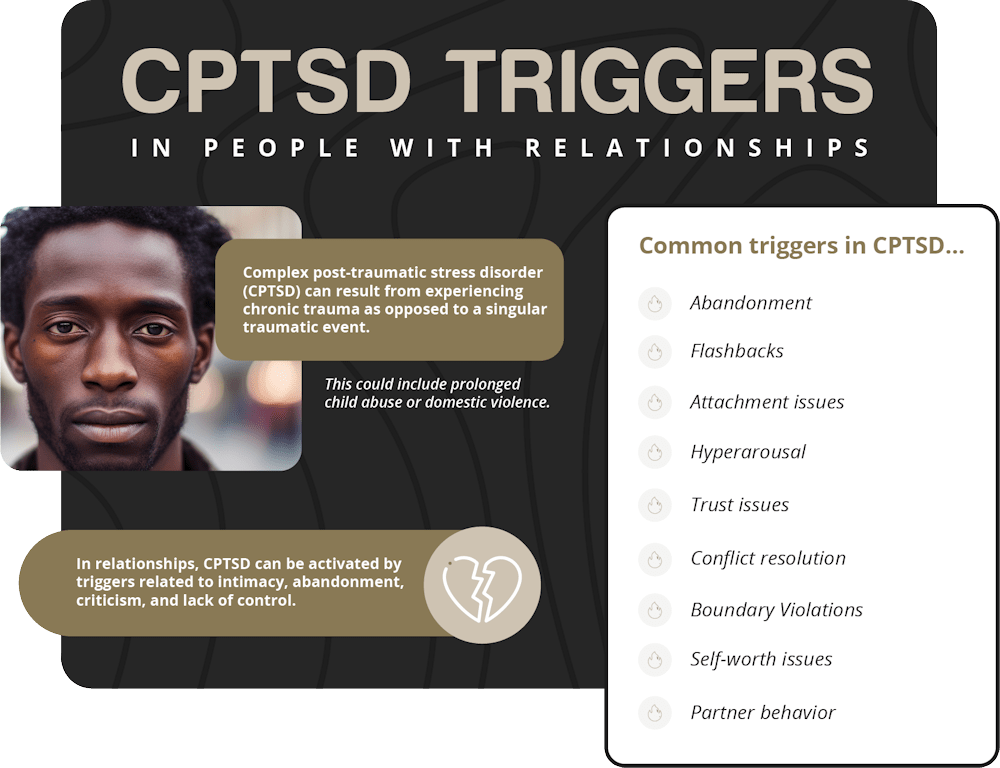Have you ever wondered why you react so strongly to certain relationship issues or feel like past traumas are affecting your current relationships? You may be experiencing complex PTSD triggers. Complex PTSD is different from regular PTSD and stems from ongoing trauma, often in childhood, rather than a single traumatic event.
In relationships, complex PTSD can be activated by triggers related to intimacy, abandonment, criticism, and lack of control. Learning to identify and manage these triggers is key to healthier relationships. The good news is that there are strategies you can use to minimize triggers, improve communication, set boundaries, and feel more secure in your relationships. While complex PTSD can complicate relationships, with work and commitment to healing, you can build intimacy and trust.
What is Complex PTSD and How is it Different from PTSD?

Complex Post-Traumatic Stress Disorder (C-PTSD) is a psychological condition that shares similarities with Post-Traumatic Stress Disorder (PTSD) but is characterized by a more complex set of symptoms and experiences. While both C-PTSD and PTSD are the result of exposure to traumatic events, they differ in several ways:
Typically, PTSD results from a single, isolated traumatic event or a short-lived series of traumatic incidents, such as a car accident, physical assault, or a natural disaster. Complex PTSD, on the other hand, often develops in response to prolonged, repetitive traumatic experiences, particularly during childhood or over an extended period. Examples include chronic abuse, neglect, human trafficking, long-term captivity, or ongoing interpersonal violence.
PTSD symptoms include flashbacks, nightmares, hyperarousal (feeling constantly on edge), and avoidance behaviors, which may be triggered by reminders of the traumatic event. C-PTSD, in addition to these symptoms of PTSD, often involves a more extensive range of symptoms, such as emotional dysregulation, distorted self-perception, problems with interpersonal relationships, identity disturbances, and a pervasive sense of emptiness and worthlessness. People with C-PTSD may struggle with trust and attachment, and they may exhibit self-destructive behaviors.
PTSD symptoms can be intense but are often time-limited, with some people recovering within months or years after the traumatic event. C-PTSD symptoms tend to be more persistent and chronic. They can affect an individual’s functioning and overall well-being for a more extended period, often decades.
Typically, PTSD does not have the same degree of impact on an individual’s self-identity and personality structure. Complex trauma, especially when experienced during childhood, can profoundly affect the development of a person’s self-concept, identity, and interpersonal skills.
While PTSD is a recognized diagnosis in the Diagnostic and Statistical Manual of Mental Disorders (DSM-5), C-PTSD is not officially recognized as a distinct diagnosis in the DSM-5. Some mental health professionals use the term “complex PTSD” to describe these more complex presentations of trauma-related symptoms.
Treatment for C-PTSD typically involves various therapeutic approaches to address its complex array of symptoms and challenges. If you or someone you know is experiencing the effects of trauma, seeking help from a mental health professional is crucial for an accurate assessment and appropriate treatment programs in Los Angeles.
What are the Most Common Complex PTSD Triggers in Relationships?
Complex Post-Traumatic Stress Disorder (C-PTSD) can manifest in various ways within relationships, and certain triggers can exacerbate symptoms and disrupt the dynamics between individuals. Here are nine common triggers of C-PTSD within relationships:
Individuals with C-PTSD may have experienced repeated abandonment or rejection in the past, which can make them hypersensitive to any signs of perceived abandonment or rejection in their current relationships. This can lead to anxiety and fear of being abandoned or rejected, causing difficulties in trust and emotional intimacy.
Certain situations or behaviors of a partner may trigger flashbacks or intrusive memories related to past traumatic events. These flashbacks can be distressing and make it challenging to stay present in the current relationship.
C-PTSD can lead to attachment difficulties. Some individuals might become overly dependent on their partners for a sense of safety and security, while others may avoid emotional closeness altogether due to a fear of vulnerability.
C-PTSD can result in heightened or dulled emotional responses. Hyperarousal may manifest as extreme emotional reactions, anger, or irritability, making it challenging to communicate effectively with a partner. Hypoarousal, on the other hand, can lead to emotional numbness, detachment, and a lack of responsiveness, which can create distance in the relationship.
Trust issues are common in individuals with C-PTSD. They may have been betrayed or manipulated in the past, leading to a general mistrust of others. This lack of trust can affect building a healthy and secure relationship.
The fear of conflict or confrontation due to past experiences can make it challenging for individuals with C-PTSD to engage in healthy conflict resolution. They might withdraw or become passive-aggressive rather than openly addressing issues.
In cases of interpersonal trauma, boundaries are often violated. This can result in difficulty setting and maintaining boundaries in current relationships. Individuals may struggle to assert their needs and may become enmeshed or codependent.
Trauma can profoundly impact self-worth and self-esteem. Individuals with C-PTSD may feel unworthy of love or may seek validation excessively, which can strain relationships.
Certain behaviors or personality traits of a partner can act as triggers for someone with C-PTSD. For example, a partner’s anger, criticism, or controlling behavior may remind them of their past abusers and cause significant distress.
How Do You Manage Complex PTSD in Relationships?
If you suffer from complex PTSD, relationships can be challenging to navigate. Everyday triggers, like criticism or intimacy, can bring up painful memories and cause distressing symptoms. The impact on relationships is multifaceted and can cause trust issues, communication difficulties, emotional dysregulation, attachment problems, and triggers from past trauma. However, with the right strategies and support, individuals with C-PTSD can work to improve the quality of their relationships.
To manage complex PTSD in relationships,
Explain how certain actions may be misinterpreted and what your partner can do to support you. This avoids misunderstandings and brings you closer together.
Determine what level of intimacy and independence you need, and communicate this to your partner. Enforce these limits to feel safe in the relationship.
Make sure to engage in regular self-soothing activities like exercise, mindfulness, or art therapy. Taking good care of yourself will make you better equipped to handle triggers with your partner.
Recognize and celebrate the progress you make in managing C-PTSD and improving your relationship. Small victories, like effectively communicating during a triggering situation, should be acknowledged and appreciated as signs of growth.
While it’s important to support each other, remember to maintain your individual identities and interests. Pursuing personal goals and interests outside the relationship can provide a sense of fulfillment and reduce the risk of emotional co-dependency.
Speaking to a trauma-informed therapist, either individually or as a couple, can help give you strategies to improve communication and set healthy boundaries.
With work and commitment to understanding each other, individuals with complex PTSD can have stable, meaningful relationships. The key is openness, honesty, and mutual support in facing challenges together.
Is Complex PTSD Treatable?
While there is no definitive cure for Complex Post-Traumatic Stress Disorder (C-PTSD), numerous treatment options are available to effectively address and manage its symptoms.
Cognitive behavioral therapy is a widely used and evidence-based therapeutic approach that focuses on changing negative thought patterns and behaviors. In the context of C-PTSD and relationships, it helps individuals identify and modify maladaptive thought patterns and behaviors that result from traumatic experiences. This includes challenging distorted beliefs related to self-worth, safety, and trust. CBT equips individuals with practical coping strategies and tools to manage symptoms, including anxiety and depression. Exposure therapy, a component of CBT, can help individuals confront and process traumatic memories gradually, reducing their emotional impact over time.
Trauma-focused therapies, such as EMDR (Eye Movement Desensitization and Reprocessing) and Somatic Experiencing, are specifically designed to address trauma-related symptoms. EMDR, for example, involves reprocessing traumatic memories through guided eye movements or other forms of bilateral stimulation. Somatic Experiencing focuses on the body’s physical responses to trauma and helps individuals release stored trauma energy. These therapies aim to desensitize traumatic memories, reduce their emotional charge, and promote healing. They can be particularly effective for individuals with complex PTSD triggers as they target the root of the condition, allowing individuals to work through past traumas.
Experiential therapies, like art therapy, music therapy, and adventure therapy, offer non-traditional, hands-on approaches to healing. These therapies encourage individuals to express themselves and process trauma through creative, physical, or nature-based activities. They can be especially beneficial for individuals who struggle with verbalizing their experiences or have difficulty connecting with their emotions. Experiential therapy allows individuals to explore their feelings in a safe and supportive environment, often leading to increased self-awareness and emotional release.
The effectiveness of C-PTSD treatment varies among individuals, and often a combination of therapies is most effective. The choice of therapy should be based on individual needs and preferences, highlighting the importance of consulting a qualified mental health professional to create a personalized treatment plan addressing unique experiences and challenges.
Received Comprehensive Healing for PTSD at Westwind Recovery®


Dr. Deena is the Chief Clinical Officer of Westwind Recovery®, an award-winning outpatient treatment center in Los Angeles where she oversees the clinical and administrative program and treatment methods. Dr. Deena is a doctor of psychology and licensed clinical social worker since 1993. LCSW #20628. Originally from the East Coast, Dr. Deena has worked running treatment centers, worked as a therapist in psychiatric hospitals as well as school settings and currently has a thriving private practice in the LA area. Dr. Deena has appeared regularly on the Dr. Phil Show as an expert since 2003. She has also been featured on many other TV shows, podcasts and has contributed to written publications as well as podcasts.





